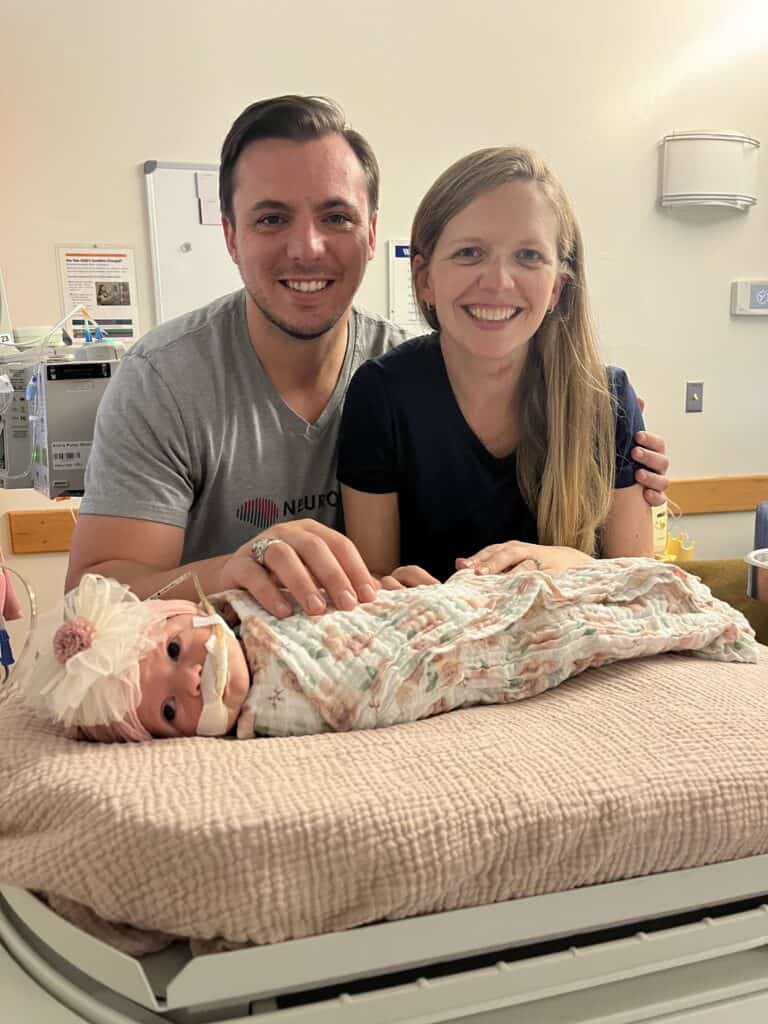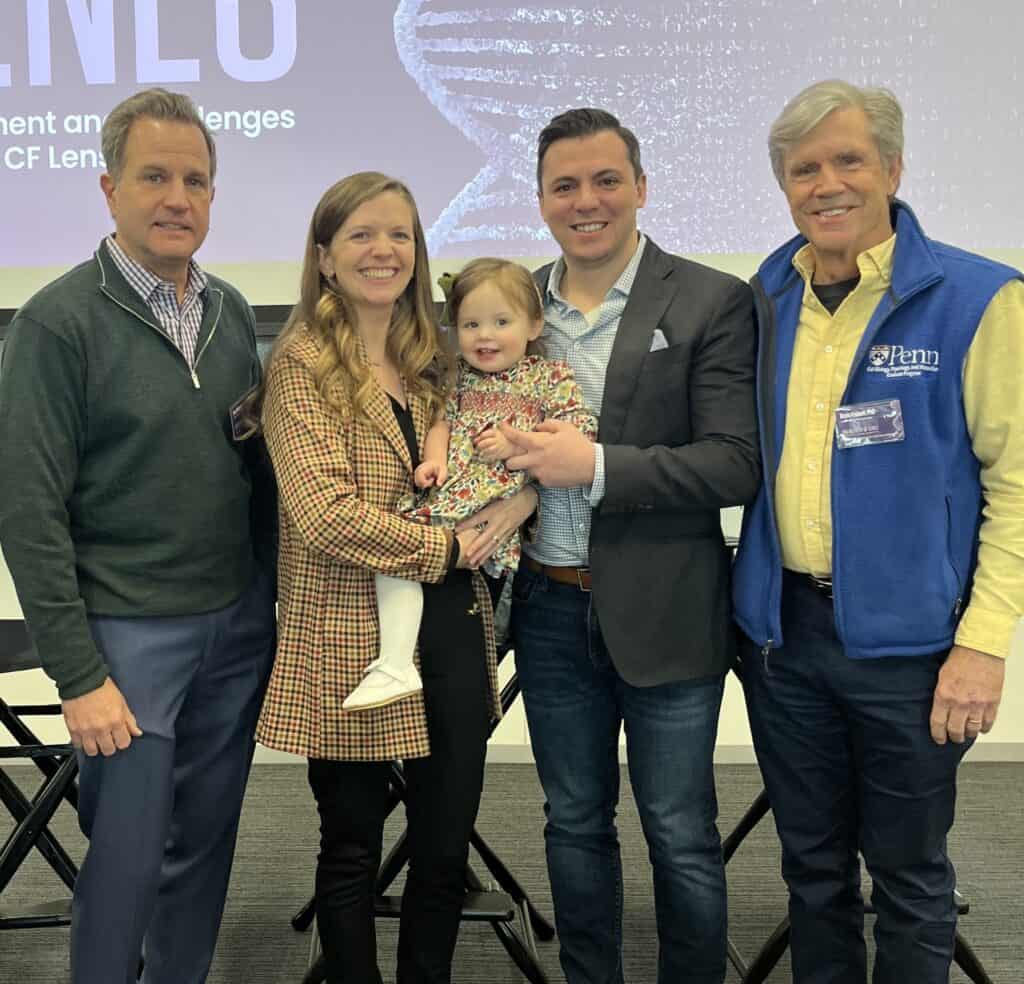CF före födseln: Hur ett par använde modulatorer för in utero-behandling för att förbättra hälsoutfallet för sitt barn
Under CF Awareness Month bjuder Emily's Entourage in medlemmar i CF-communityn att dela med sig av sina berättelser. Dagens blogginlägg handlar om Chris och Erica Molaro, ett par som vidtog åtgärder för att behandla sin ofödda dotter som diagnostiserats med CF, genom att använda CFTR-modulatorer under medicinsk övervakning för att ge behandling i livmodern och förbättra hennes hälsoutfall.
I januari 2023 fick vi ett livsavgörande besked: vår blivande dotter skulle födas med cystisk fibros (CF).
Närmare bestämt skulle hon födas med två kopior av genmutationen F508del. Nyheten var en chock - ingen av våra familjer har CF i sin historia, åtminstone inte vad vi känner till. Vi fick veta att vi båda var bärare av genmutationen först när hon fick sin diagnos.
 Dagen då vi fick reda på att hon skulle födas med CF kommer för alltid att vara inristad i vårt minne. Sanningen är att det var en fruktansvärd nyhet. Det var tragiskt. Det var förödande.
Dagen då vi fick reda på att hon skulle födas med CF kommer för alltid att vara inristad i vårt minne. Sanningen är att det var en fruktansvärd nyhet. Det var tragiskt. Det var förödande.
Det innebar att vår dotter skulle leva med ett fruktansvärt, dödligt och progressivt tillstånd resten av sitt liv. Det skulle innebära sjukhusvistelser, dagliga mediciner, daglig bröstgymnastik, flera gånger om dagen för att rensa luftvägarna, risk för undernäring, sannolikt akut tarmkirurgi och så vidare.
Trots den hjärtskärande prognosen var vi fast beslutna att se på situationen med optimism.
Med utgångspunkt i Marcus Aurelius stoiska filosofi fokuserade vi på vad vi kan och vägrade låta CF överskugga glädjen över att vänta vårt första barn.
Även om de utmaningar som låg framför oss var skrämmande fann vi hopp i de framsteg som gjorts inom CF-vården och i det medicinska stöd i världsklass som fanns nära vårt hem. Det fanns fortfarande så mycket att vara hoppfull om - särskilt med vår dotter på väg.
Drivna av denna orubbliga önskan att säkerställa bästa möjliga resultat för vårt barn, ledde vår jakt på hopp oss till löftet om en ny mutationsinriktad CFTR-modulatorbehandling. Läkemedlet, som tas två gånger dagligen, modulerar CFTR-proteinet (cystic fibrosis transmembrane conductance regulator), som reglerar flödet av salt och vatten in i och ut ur cellerna, och angriper grundorsaken till CF snarare än bara symptomen.
Att få höra talas om denna mutationsinriktade CFTR-modulatorbehandling kunde inte ha kommit tillräckligt snart. Vårt barn hade tre månader kvar till födseln och visade en ekogen tarm på ultraljud. Det är ett vanligt tidigt tecken på CF och kan leda till allvarliga komplikationer som tarmperforation, sepsis och död om det inte åtgärdas.
Under överinseende av sitt medicinska team blev Erica modigt nog den fjärde mamman att ta CFTR-modulatorn under graviditeten för att behandla vår dotter i livmodern.
Hennes ekogena tarm verkade stabiliseras.
Den 22 maj 2023 kom vår vackra lilla flicka till världen. Hennes tarmproblem hade visserligen förbättrats, men inte helt försvunnit, och hon kämpade med mekoniumileus - ett annat vanligt symptom hos barn med CF - vilket ledde till en 16 dagar lång vistelse på neonatalavdelningen.
Även om vi stod inför utmaningar var vi oerhört tacksamma för att operation kunde undvikas och innan vi visste ordet av var vi hemma, redo att påbörja vår resa tillsammans.
 Efter att ha skrivits ut från sjukhuset tog Erica ytterligare ett modigt steg genom att fortsätta behandlingen med CFTR-modulator under ledning av sitt medicinska team. Den här gången gav hon behandlingen genom bröstmjölken, vilket gjorde henne till en av de första, om inte den första, mamman som gjorde det.
Efter att ha skrivits ut från sjukhuset tog Erica ytterligare ett modigt steg genom att fortsätta behandlingen med CFTR-modulator under ledning av sitt medicinska team. Den här gången gav hon behandlingen genom bröstmjölken, vilket gjorde henne till en av de första, om inte den första, mamman som gjorde det.
Ett av sätten att diagnostisera CF är genom en svett-kloridtest. Personer med CF kan inte reglera saltet i kroppen, så deras svett är bokstavligen saltare. Alla kloridvärden som är högre än 60 mmol/L är diagnostiserbara för CF.
Vår dotters första svettprov, som togs ungefär en vecka efter födseln, var 83. Även om detta inte var överraskande på grund av hennes diagnos, var det lovande att se att resultatet var lägre än vad som är typiskt för hennes mutationstyp.
För att följa vår dotters framsteg samarbetade vi med vårt medicinska team för att planera in regelbundna svettprov med några månaders mellanrum för att bedöma hur behandlingen via bröstmjölk påverkade henne - även om denna metod vid den tidpunkten var oprövad och otestad.
Några månader efter hennes första svettprov kom resultaten från hennes andra test. Hennes läkarteam ringde oss överlyckliga: "Såg ni resultaten? Hennes svettprov visade 57!"
Kort därefter förbättrades resultatet av hennes tredje svettprov ytterligare till 33.
Nu, när vår dotter närmar sig sin andra födelsedag, var hennes senaste svettprov 27. Hon har tillräckligt med bukspottskörtelcancer och har samma anda (och attityd) som vilket litet barn som helst.
Ja, hon har fortfarande CF; det här är inte en berättelse om ett botemedel, men det är en berättelse om hopp och framsteg. Hennes CF är fortfarande allvarlig, men den hanteras. När vi nyligen deltog i Emily's Entourage Scientific Symposium sa en av forskarna från det företag som tillverkar vår dotters CFTR-modulator: "Hon har CF, men lever inte med CF." Det fångar hur vi känner varje dag - även om sjukdomen fortfarande är en del av hennes liv definierar den henne inte.
Modern vetenskap har inneburit otroliga framsteg. En av dem, denna CFTR-modulator, har varit en välsignelse för vår familj, men sanningen är att den fortfarande är utom räckhåll för många personer med CF. Behandlingen är kostsam, begränsad i tillgänglighet och den är endast effektiv för personer med specifika CF-mutationer, vilket innebär att ungefär 10% av alla personer med CF saknar alternativ. Vi måste fortsätta att tänja på gränserna för forskningen, sträva efter att hitta effektiva behandlingar för den bredare CF-gruppen och arbeta mot det ultimata målet: att göra CF till ett minne blott för alla som lever med denna hemska sjukdom.
Författarna

Chris är VD för NeuroFlow, en plattform för dataanalys och vårdaktivering som stöder integration av beteendehälsa och leverantörer av beteendehälsa. Han är utbildad vid US Military Academy i West Point och Wharton School vid University of Pennsylvania. Som kapten i den amerikanska armén tilldelades han Bronze Star under en utplacering i Irak, och senare, efter att ha grundat NeuroFlow, vann han EY:s utmärkelse Entrepreneur of the Year.
Erica är Physician Assistant på Jefferson Health och specialiserar sig på beroendemedicin. Hon är utbildad vid University of Pittsburgh och Marywood University och håller för närvarande på att ta sin doktorsexamen i hälsovetenskap (DHs) vid Thomas Jefferson University.
Familjen Molaro bor i Philadelphia och tycker om att vandra, utforska och resa. Madison, som bara är 23 månader gammal, mår bra, tycker om att resa, har varit i 6 länder, 8 delstater och på över 40 flygningar, och njuter naturligtvis av eftermiddagarna i den lokala parkens gungställning.
